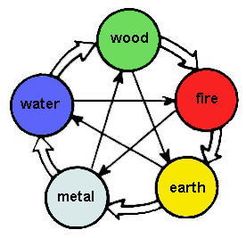WU XING OR FIVE ELEMENTAL PROCESSES

Wu Xing or Five Elemental Process, taken from https://boardgamegeek.com/boardgame/66970/wu-xing
Question
Do you have any information or know where I could get information on the different elements and what emotions are represented by each element?
— Susan, Ireland
Answer
“Five Elements” is a wrong translation made by early European writers of the Chinese philosophical concept of “Wu Xing” due to their insufficient understanding of the Chinese concept, but the English term has become established and almost everyone today uses it without realizing the mistake.
“Wu Xing” means “Five Movements” or “Five Processes”. This philosophical concept refers to processes, and not to elements. The mistake was made probably because the early European writers wrongly related this Chinese philosophical concept with the Indian philosophical concept of “Four Elements”.
In Indian philosophy, the “Four Elements” refer to “earth”, “water”, “air” and “fire”, from which everything in the world is made. But this Indian concept is also inadequately understood. “Earth”, “water”, “air” and “fire” are symbolic, not realistic, terms. What is meant is not that everything is made of earth, water, air and fire; what is meant, as explained by the Buddha, is that everything is made of four “ultimates”, symbolized by “earth”, “water”, “air” and “fire” — what modern physicists might call quarks with down, bottom, up and top spin.
While the “Four Elements” of the Indians refer to “substance”, the mis-translated “Five Elements” of the Chinese refer to processes. There are, of course, countless processes in the world, but the Chinese generalize these countless processes into five archetypes, symbolized as “metal”, “water”, “wood”, “fire” and “earth”.
In the Chinese language, the “Four Elements” in Indian philosophy are called “xi da”, which means “four greats”; and the mis-translated “Five Elements” in Chinese philosophy are called “wu xing”, which means “five movements”. Thus, there is no confusion in the Chinese language as two different terms — “da” and “xing” — are used. Confusion arises in the English language when the same term “element” is used for two different concepts, “da” (great) and “xing” (movement).
In an attempt to help clarify the confusion, I have used the term “Five Elemental Processes” instead of “Five Elements” for the philosophical concept of “wu xing”. I would prefer “Five Processes”, which is both literally and figuratively closer to “wu xing”, but I retain the word “Elemental” to maintain the link with the common term “Five Elements” although it is wrongly translated.
You can find mention of “wu xing” in many books on Chinese philosophy, Chinese medicine, kungfu, feng shui (the Chinese art of environmental energy) and Taoism, but as far as I know all these books in English use the term “Five Elements”. Also, not a single of them explains the philosophical concept of “wu xing”; at the most, some of these books merely repeat the trite description that “metal destroys wood”, “wood destroys earth” and so on, which is actually not saying anything. I can safely say that the authors themselves do not understand the real meaning of “wu xing”; they also do not know what is actually meant by “metal destroys wood”, etc.
I believe I am the only one so far writing in English to explain “wu xing” as “five processes” and not “five elements”. Detailed explanation can be found in my book, “The Art of Chi Kung”, and further explanation can be found in my forth-coming book, “The Complete Book of Chinese Medicine”. The following is only a brief explanation.
Processes with sonorous characteristics are symbolized as “metal”, processes with spreading characteristics symbolized as “water”, processes with growing characteristics symbolized as “wood”, processes with rising characteristics as “fire”, and processes with centralizing characteristics as “earth”. An example of a “water” process is an expansion of a business, an example of a “wood” process is setting up of new branches, and an example of a “fire” process is quarrelling.
When business expands, new branches are set up. This is symbolized as “water creates wood”. When there are more branches, they tend to quarrel among themselves. This is symbolized as “wood creates fire”. To overcome the quarrelling, the general manager may expand his control over the branch managers. This is symbolized as “water destroys fire”.
In the field of emotions, grief is symbolized by “metal”, fear by “water”, anger by “wood”, joy by “fire”, and worry by “earth”. If you are sad or depressed, you can overcome your emotional problem by becoming happy. This is “fire destroys metal”. How you may implement the principle of “fire destroys metal” will depend on your skill or the skill of your doctor. As the heart corresponds to “fire”, one excellent way is to practise chi kung to open your heart. In fact the term “kai xin”, which literally means “open heart”, is the Chinese term for being happy.
The above is taken from Question 6 of January 2002 Part 3 of the Selection of Questions and Answers.
LINKS
Courses and Classes
